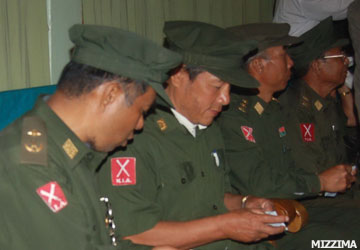Chiang Mai (Mizzima) – The Thailand-based Kachin News Group reported on Monday that Dr. Saboi Jum was trying to mediate between the Kachin Independence Organization (KIO) and the new government. Saboi Jum, 75, the former general secretary of the Kachin Baptist Convention and the founder of the Shalom Foundation, mediated a peace agreement between the junta and KIO in 1994. However, since September 2010, the tension between the authorities and the KIO has increased due to the KIO rejection of the Border Guard Force (BGF) plan. In October 2010, state-run newspapers labeled the KIO an ‘insurgent group’. Mizzima correspondent Phanida interviewed Saboi Jum on the KIO, the regime and Kachin State’s road to peace.
Question: Is it true that you are trying to mediate between the government and the KIO?
Answer: I haven’t started to do that because both sides have not given me a signal. If both sides want it, I would take the responsibility to attempt to mediate.
Q: You mean that you would do it if asked?

A: Yes, it’s our fundamental unfinished duty, and we need to move on. We need to observe the policies of the new government. The KIO should do something to make peace. There needs to be a serious dialogue between both sides. If so, we can hope that the problems will be solved.
Q: Please us about your meeting with the KIO.
A: We talked about the junta’s Border Guard Force plan. Our meetings were held from August 14 to 18, 2010. Then the KIO invited the general public and held a discussion meeting in Laiza. They talked about the BGF plan, and they listen to the people’s voices.
Q: After that meeting, did you meet with KIO leaders?
A: Yes, I met them on Anti-Fascist Resistance Day. But, we met not to talk about how we could achieve peace. We met on other matters.
Q: In the past, how and with whom did you attempt to mediate between the junta and KIO?
A: In 1994, the former diplomats Hla Wom, Khun Myat and I tried to help in negotiating between the junta and KIO. Other people also supported us. In fact, the negotiations between the two sides was started in 1980-81, and it was an unfinished task. At that time, the KIO said that the unfinished task needed to be completed some day. In 1989, the KIO and government restarted the negotiations and a mutual agreement was reached later. But, the cease-fire agreement ended last year in September.
Q: Has the new government talked about a dialogue?
A: No. We are waiting for the new president’s peace overture. The case depends on the new government. I hope we have opportunities. I think that the new government is willing to open the door to peace, and we all need to find the path.
Q: Are you optimistic that a peace can be established or not?
A: I’m optimistic about both sides willingness to talk about a political dialogue. We need to do first things first and then go on to a dialogue. Only genuine peace can be a permanent peace. I hope both sides will try to establish a genuine peace. We mediators have told the government to engage in dialogue. If both sides are willing to hold a serious dialogue, peace can be established. That’s my view.
Q: What is the KIO’s attitude? Have they asked for your help in starting negotiations with the government?
A: No. But still, I hope that they are willing to try to solve the problems via peaceful ways and a political dialogue.
Q: Do you think that they are waiting for an call by the new government?
A: In my opinion, according to the speech of the new president, the government has opened a door to dialogue.
Q: What do you think will happen next?
A: Trying to establish peace is the unfinished business, so we must take every opportunity and chance to make peace.


